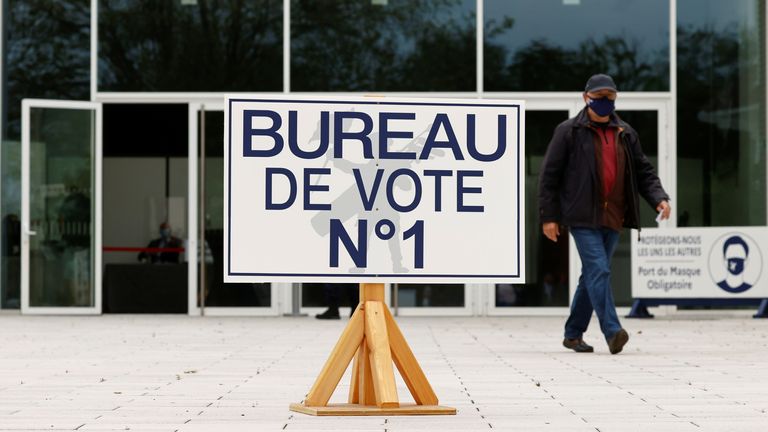France: Far-right performed worse in regional elections than predicted, exit polls suggest
Marine Le Pen's Rassemblement National express frustration at a low turnout after being tipped to win a region for the first time.
Sunday 20 June 2021 23:03, UK
France's far-right has performed worse than predicted in the country's regional elections, exit polls suggest, leaving victory in the southern battleground it was contesting hanging in the balance.
Voters headed to the polls on Sunday for the first round of elections in all of France's 13 regions, which will test the voter mood ahead of presidential elections in less than a year's time.
Marine Le Pen's Rassemblement National (RN) had been tipped to win one region for the first time, in the southern battleground of Provence-Alpes-Cote d'Azur. A win there would suggest an RN presidency from next year was not off the table.
President Emmanuel Macron's La Republique en Marche was predicted to win not one region and has today finished fifth in the exit poll.
Pollster Elabe had projected a high abstention rate of 68.5% in Sunday's first-round vote, which fell not long after months of tough COVID-19 restrictions had been eased.
Marine Le Pen's party expressed frustration at a record low turnout.
Jordan Bardella, Ms Le Pen's lead candidate in the greater Paris region, claimed "the government won because for the last few weeks it has been in search of a massive abstention rate".
An IPSOS exit poll showed the centre-right Les Republicains winning 27.2% of the national vote, ahead of the far-right on 19.3%, followed by the Green party, the Socialist Party and President Macron's La Republique en Marche on 11.2%.
The regional elections, which include a second round on 27 June, were expected to test the appeal of far-right leader Ms Le Pen and whether she has successfully moved closer to the political mainstream.
She had been hoping to capitalise on a rebrand in an attempt to detoxify her image, which saw her ditch promises of "Frexit" and inflammatory rhetoric.
Her party has strong support in the region around Marseille and Nice.
Of Ms Le Pen's softened image, Bruce Teinturier, an analyst at pollster IPSOS, said: "She appears less extreme in the eyes of the French, less dangerous for democracy than she did a decade ago."
Gaining one region would give Ms Le Pen a major boost ahead of the presidential elections and would deal a major blow to Mr Macron - who has painted himself as a barricade against the far-right.
In the north, the incumbent and frontrunner for the conservatives' presidential candidate, Xavier Bertrand, is running against RN's spokesman, Sebastien Chenu, and Mr Macron's justice minister, Eric Dupond-Moretti.
Mr Dupond-Moretti will have to gain at least 10% of votes for the RN to force Mr Bertrand into an alliance, which would undermine the conservative candidate's pitch as a challenger to Mr Macron next year.
But a win for Mr Bertrand would boost his chances of becoming the conservatives' presidential candidate.
Mr Macron's aides see the former health minister as a rival who would erode the president's centre-right voting base.







